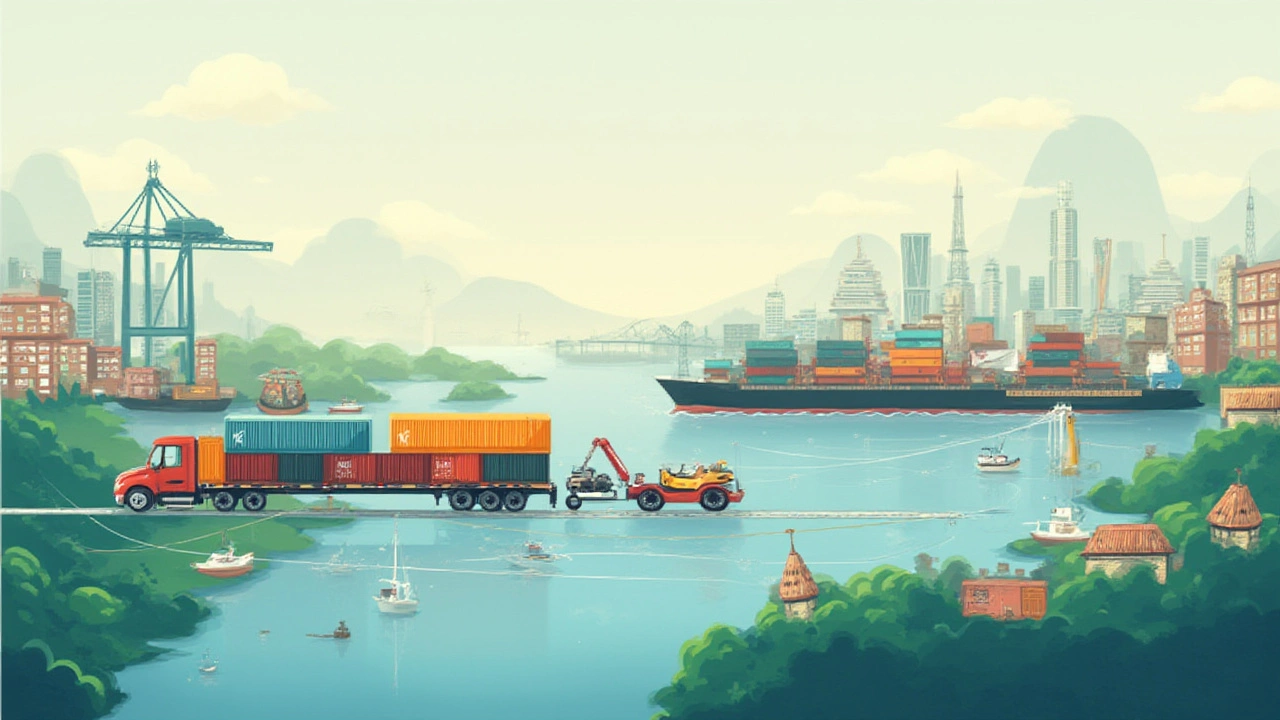The world’s biggest retailers, from Amazon to Tesco, don’t just compete on price. They race against the clock to get goods from factories in China and Vietnam to your doorstep in Liverpool or London. But have you ever wondered who pulls the strings behind this endless parade of lorries, ships, and planes? Freight forwarders are the unsung heroes turning global chaos into smooth delivery. And guess what? This isn’t just a checkbox task or a job for someone with a clipboard. Freight forwarding is a honed skill—not fluff, not luck, but a rare mix of know-how, hustle, and sharp instincts.
What Does a Freight Forwarder Really Do?
Picture this: your favourite pair of trainers isn’t made down the street. It travels halfway across the world, jumping from truck to port, ship, rail, and finally some bloke drops it at your door. That journey involves dozens of potential problems—missing paperwork, customs hold-ups, strikes at ports, sudden storms, you name it. The freight forwarder’s job is to clear those hurdles and get your package to you on time, every time. So, what are they actually doing all day?
They coordinate every link in the supply chain. They choose the best routes, compare quotes from carriers, and keep an eye on international regulations that change like Liverpool weather. It’s far from paint-by-numbers. Each shipment is a puzzle with moving parts, new destinations, and constant snags. These pros juggle communication with clients, shippers, customs agents, and haulage partners—sometimes across three time zones at once. One slip-up? That could mean per-day storage costs at the port, a container stuck for months, or even lost business if deadlines are missed.
Records show that over 90% of international trade moves by sea, according to the International Maritime Organization. But a ship can’t load itself, nor can it predict if a port worker’s strike will delay delivery. That’s where personal skill comes in—solving issues on the fly. Freight forwarders need to read people and situations like a book. Problem-solving is second nature. Is the paperwork missing a signature? They’ll get it in hours, not weeks. Is there a flood in Chennai that’s blocking road transit? They’re already arranging an alternate route. It’s no surprise that some freight forwarders have backgrounds as varied as ex-military logistics officers, multilingual negotiators, or former operations managers at airlines.
Key Skills Every Freight Forwarder Needs
So what skills matter here? It’s a mix of street smarts, technical knowledge, and people skills. Some would say it’s a blend you can’t fake—or automate. Let’s break down what makes a top-notch freight forwarder stand out:
- International documentation and compliance: They know how to complete bills of lading, export declarations, and dangerous goods forms without missing a beat.
- Negotiation:
- Rates with shipping lines, airlines, and truckers change week by week. Freight forwarders haggle for the best prices so clients stay profitable.
- Networking:
- They maintain contacts at ports, depots, and customs offices globally. Those relationships resolve bottlenecks faster than any app.
- Technology skills:
- Modern freight forwarders work on platforms like CargoWise or Kuehne+Nagel’s eShip to track and automate shipments.
- Multitasking:
- It’s common to juggle five or more shipments at varying stages, handling each with precision despite unpredictable challenges.
- Attention to detail:
- A single typo in a customs declaration can cause week-long delays or hefty fines.
A 2022 survey by the British International Freight Association (BIFA) highlighted that nearly 80% of logistics firms struggled to fill freight forwarding positions because so few people had this unique mix of skills. One experienced forwarder said,
“Freight forwarding is like solving a Rubik’s cube that changes colours when you touch it—every day brings a new twist.”
If you fancy breaking into the industry, formal training helps, but the learning curve is steep. Apprenticeships and certified programmes exist (like the FIATA Diploma in Freight Forwarding), but real expertise only comes through years in the trenches. You can’t master customs clearance by reading a manual; you learn it by wrestling with live shipments and tight deadlines.

Freight Forwarding vs. Other Logistics Jobs: What’s Special?
People often mix up freight forwarders with couriers, warehouse managers, or even customs brokers. But forwarding is its own beast. The biggest difference? Forwarders don’t own trucks or ships—they manage the logistics on behalf of shippers. It’s a little like being a travel agent for cargo. They design the best journey from A to B, often using third-party carriers at every stage.
Check out this quick table comparing freight forwarders to other supply chain roles:
| Role | Main Task | Skill Focus |
|---|---|---|
| Freight Forwarder | Coordinate multimodal shipping | Problem-solving, documentation, negotiation |
| Courier | Final mile delivery | Time management, customer service |
| Warehouse Manager | Inventory control | Organisation, team management |
| Customs Broker | Clear customs formalities | Compliance, paperwork expertise |
Why does this distinction matter? Because a lot of new hires look at listings for ‘freight administrator’ or ‘shipping clerk’ and assume it’s all desk work. But real forwarders are proactive fixers and planners, not paper-pushers. Things go wrong—a lot. The Ever Given blocking the Suez Canal in 2021 left $9.6 billion worth of goods (per Lloyd’s List) stranded every single day. Forwarders scrambled to reroute containers across continents. It was like rewriting the script of global trade, overnight. Only skilled professionals can handle this level of pressure and make the right calls with incomplete information.
If you’re hunting for a role that changes daily and values adaptability over routine, this is the field to look at. Freight forwarding isn’t just about shifting boxes; it’s about knowing the right questions to ask, seeing bottlenecks before they choke the supply chain, and being persuasive enough to squeeze favours out of port authorities at 1 AM on a Friday night.
Can Freight Forwarding Really Be Taught?
Let’s be honest. You can’t just pick up these skills in a weekend seminar. Sure, you can memorise the names of major shipping lines (Maersk, Mediterranean Shipping Company, etc.), or read up on Incoterms like FOB and DDP. But you need more than head knowledge. Freight forwarding is full of real-world curveballs: weather disruptions, strikes, new trade sanctions, or even a client who forgets to declare a hazardous material. No two shipments are ever the same.
Learning the ropes usually starts with mentorship. Old hands in the sector often describe their job as ‘controlled chaos’. Newbies often shadow experienced forwarders, listening in on negotiation calls or watching how they juggle transport schedules, insurance, and customs. You learn by doing—and failing. That means running into a delayed shipment or a missing certificate and figuring out how to fix it before customers start phoning in panic.
There’s also a huge shift in the past five years: digital skills now matter as much as traditional logistics. Shipment tracking, predictive analytics, and online document management are now part of the daily grind. Top firms invest in upgrading their teams, with annual training budgets and subscriptions to industry software. AI is popping up, but it doesn’t replace the human touch—negotiations, reading cultural cues, or knowing when to escalate a problem to management.
Those aiming to stand out in freight forwarding should focus on:
- Learning to read trade regulations and stay ahead of changes post-Brexit or post-COVID trade shifts.
- Brushing up on software for shipment tracking and data analytics—CargoWise, SAP, or even good old Excel.
- Building a global network of reliable contacts, as favours and fast fixes travel far in this business.
- Time management—juggling deadlines for clients spread from Felixstowe to Shanghai or New York.
- Developing negotiation skills—not just to hustle a better price, but to get late cargo prioritised or clear a shipment from customs in record time.
At its core, freight forwarding work is a blend of skill and art. It’s not something you can fake. People spot inexperience fast—mistakes cost real money. That’s why senior forwarders are always in demand, snagging higher salaries and promotions after racking up years in the trenches.
So, is freight forwarding a skill? No doubt about it. It’s a craft for agile minds, savvy negotiators, and unflappable planners. If you’re after a challenge where no day is the same, this field could be your ticket to a world-sized career with a real impact on the global stage.


